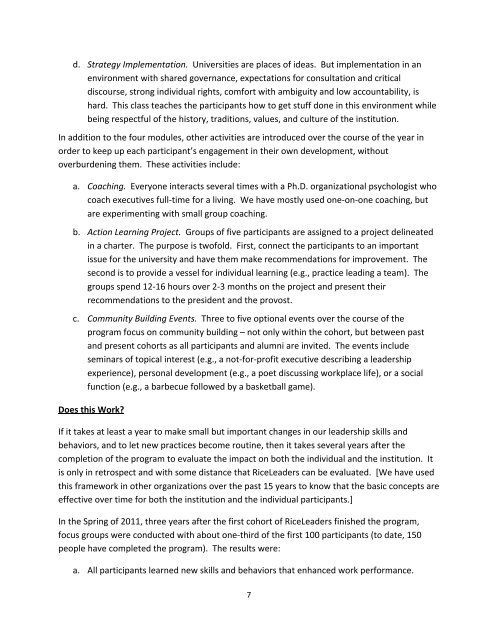Leadership Development in Support of Organizational Transformation
Leadership Development in Support of Organizational Transformation
Leadership Development in Support of Organizational Transformation
Create successful ePaper yourself
Turn your PDF publications into a flip-book with our unique Google optimized e-Paper software.
d. Strategy Implementation. Universities are places <strong>of</strong> ideas. But implementation <strong>in</strong> an <br />
environment with shared governance, expectations for consultation and critical <br />
discourse, strong <strong>in</strong>dividual rights, comfort with ambiguity and low accountability, is <br />
hard. This class teaches the participants how to get stuff done <strong>in</strong> this environment while <br />
be<strong>in</strong>g respectful <strong>of</strong> the history, traditions, values, and culture <strong>of</strong> the <strong>in</strong>stitution. <br />
In addition to the four modules, other activities are <strong>in</strong>troduced over the course <strong>of</strong> the year <strong>in</strong> <br />
order to keep up each participant’s engagement <strong>in</strong> their own development, without <br />
overburden<strong>in</strong>g them. These activities <strong>in</strong>clude: <br />
a. Coach<strong>in</strong>g. Everyone <strong>in</strong>teracts several times with a Ph.D. organizational psychologist who <br />
coach executives full-‐time for a liv<strong>in</strong>g. We have mostly used one-‐on-‐one coach<strong>in</strong>g, but <br />
are experiment<strong>in</strong>g with small group coach<strong>in</strong>g. <br />
b. Action Learn<strong>in</strong>g Project. Groups <strong>of</strong> five participants are assigned to a project del<strong>in</strong>eated <br />
<strong>in</strong> a charter. The purpose is tw<strong>of</strong>old. First, connect the participants to an important <br />
issue for the university and have them make recommendations for improvement. The <br />
second is to provide a vessel for <strong>in</strong>dividual learn<strong>in</strong>g (e.g., practice lead<strong>in</strong>g a team). The <br />
groups spend 12-‐16 hours over 2-‐3 months on the project and present their <br />
recommendations to the president and the provost. <br />
c. Community Build<strong>in</strong>g Events. Three to five optional events over the course <strong>of</strong> the <br />
program focus on community build<strong>in</strong>g – not only with<strong>in</strong> the cohort, but between past <br />
and present cohorts as all participants and alumni are <strong>in</strong>vited. The events <strong>in</strong>clude <br />
sem<strong>in</strong>ars <strong>of</strong> topical <strong>in</strong>terest (e.g., a not-‐for-‐pr<strong>of</strong>it executive describ<strong>in</strong>g a leadership <br />
experience), personal development (e.g., a poet discuss<strong>in</strong>g workplace life), or a social <br />
function (e.g., a barbecue followed by a basketball game). <br />
Does this Work? <br />
If it takes at least a year to make small but important changes <strong>in</strong> our leadership skills and <br />
behaviors, and to let new practices become rout<strong>in</strong>e, then it takes several years after the <br />
completion <strong>of</strong> the program to evaluate the impact on both the <strong>in</strong>dividual and the <strong>in</strong>stitution. It <br />
is only <strong>in</strong> retrospect and with some distance that RiceLeaders can be evaluated. [We have used <br />
this framework <strong>in</strong> other organizations over the past 15 years to know that the basic concepts are <br />
effective over time for both the <strong>in</strong>stitution and the <strong>in</strong>dividual participants.] <br />
In the Spr<strong>in</strong>g <strong>of</strong> 2011, three years after the first cohort <strong>of</strong> RiceLeaders f<strong>in</strong>ished the program, <br />
focus groups were conducted with about one-‐third <strong>of</strong> the first 100 participants (to date, 150 <br />
people have completed the program). The results were: <br />
a. All participants learned new skills and behaviors that enhanced work performance. <br />
7


